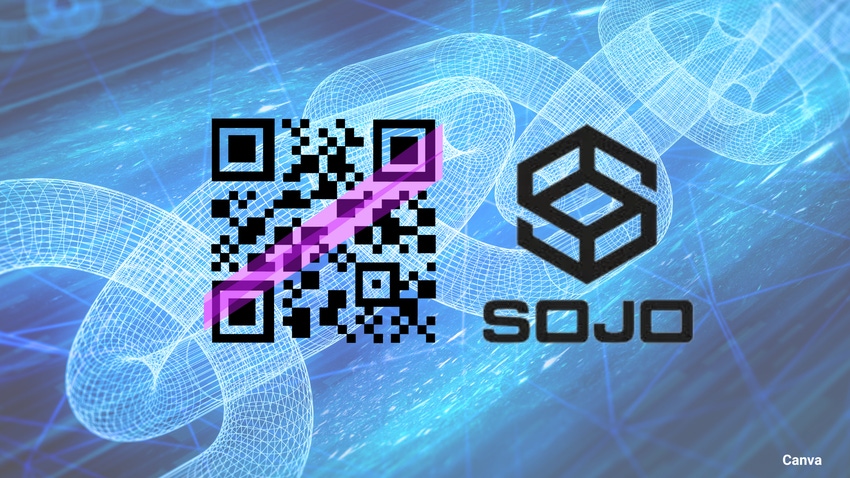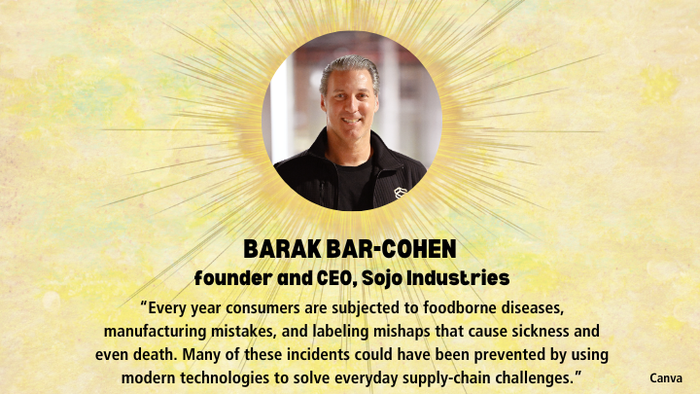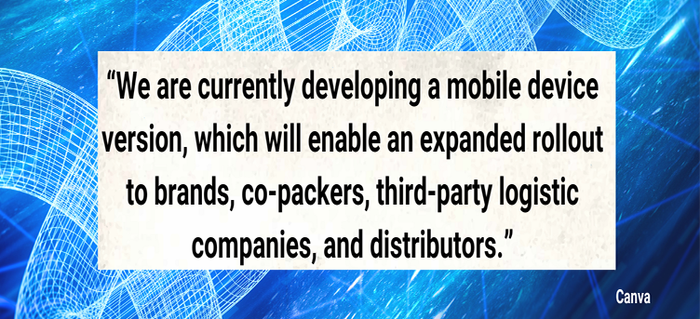Where’s Your Packaged Food? FDA Will Need to Know
Feeling pressure from FDA's traceability deadline? Sojo Shield is a game-changing, real-time solution that uses blockchain, geolocation, AI, and QR codes.

At a Glance
- FDA ruling sets agile food safety traceability deadline of 2026.
- Sojo Shield provides brands with real-time supply chain visibility.
- Use of blockchain, GPS, and AI support FDA requirements.
While there have been rumblings for improved food security for years, the need for agile traceability has officially reached a tipping point for certain perishable packaged foods in the US. These include packaged nut butters, soft cheeses, and ready-to-eat deli salads, among others.
The Food and Drug Administration set a compliance deadline of January 2026 for the Food Safety Modernization Act (FSMA) Food Traceability Rule.
The rule requires organizations to maintain records of key data elements — for example food, location, date shipped — associated with critical tracking events. Notably, brands must be able to provide these insights within 24 hours of an FDA request.
The reasoning behind the rule is a need to improve food safety. There’s an estimated 48 million cases of foodborne illnesses every year, resulting in 128,000 hospitalizations and 3,000 deaths. These measures are needed to reduce these numbers and help secure a supply chain that’s essential to everyone’s wellbeing by more quickly pinpointing and mitigating recalled foods.
It’s against this backdrop that Sojo Industries released Sojo Shield, a first-of-its-kind dock-to-dock software-as-a-service, cloud-based platform that provides immediate and accurate reporting on critical tracking events such as shipping, receiving and transport. Sojo Shield is a blockchain-based, multidevice application for Sojo customers to resolve quality and compliance issues related to production in real time, based on geolocation tracking technology.

RICK LINGLE via CANVA
“Now is the time to take tracking and tracing of food and beverage products seriously,” says Barak Bar-Cohen, founder and CEO, Sojo Industries. “Each year consumers are subjected to foodborne diseases, manufacturing mistakes, and labeling mishaps that cause sickness and even death. Many of these incidents could have been prevented by using modern technologies to solve everyday supply-chain challenges. We built Sojo Shield to enable brands to avoid these types of escalations while addressing the new FDA compliance rules. This is the moment to invest in change.”
Bar-Cohen responds to our questions in this exclusive interview.
What unmet need does Sojo Shield address?
Bar-Cohen: Sojo Shield grants consumer packaged goods brand managers, who currently have little visibility into their own production supply chain, access to a secure, robust, and highly accurate system for tracking their product in the event of a quality concern or recall. In the variety-pack world, it is extremely difficult to trace individual stock-keeping units (SKUs) once they are placed in a multi-flavor pack without having a platform with integrated systems. With Sojo Shield, complex tracking scenarios are brought to light, and trusted data is shared with brand owners.
Sojo Shield tracks pallets with traceable quantities of SKUs and lots to the individual case level.
Closeup of Sojo Shield interface shows traceability granularity. SOJO INDUSTRIES
How does it work?
Bar-Cohen: Sojo Shield relies on a system of quick-response codes generated during the automated manufacturing processes, which is integrated with a license-plating protocol and is tethered to a modern data warehouse. In the event of a product quality issue, the system generates a “customer ticket” that triggers a quick response to the query. The Sojo Shield search algorithms’ results present data on the location and status of various products compiled in a report that is sent to the customer.
The database can be queried, and data is exported in formats that are required by the FDA’s upcoming FSMA 204 requirements. Immutable logs of these transactions are stored on the blockchain for transparency and audit purposes.
Tell us more about how blockchain is used.
Bar-Cohen: Blockchain acts as the single source of truth for the critical transactions associated with shipping, receiving and product transformation. When these transactions occur, a smart contract is created on the blockchain, and geolocation data associated with the transaction is embedded in the contract text. This provides public visibility into the high-level details of the transaction without revealing any of the sensitive information contained within the exchange. When the integrity of data reports is called into question, the blockchain smart contract will stand as the ledger of record.
Does GPS or artificial intelligence play a role?
Bar-Cohen: Sojo Shield relies on geolocation pings generated by quick-response (QR) code scans. These GPS-based data points provide physical data behind critical tracking events. Manufacturing processes and integrated IoT technology inform the application of the exact time and location that the product passes through steps in the supply chain. As Shield gathers more geolocation-based data, it enables AI models to take hold and provide analytics and business insights related to the optimization of supply chain planning and execution.

RICK LINGLE via CANVA
Who’s the target customer?
Bar-Cohen: Today, the target customer for Sojo Shield is Sojo! We use our platform to support, protect, and inform our customers. We are currently developing a mobile device (scanners, iPads, iPhones, Android devices) version, which will enable an expanded rollout to brands, co-packers, third-party logistic companies, and distributors. The Sojo Shield platform is designed for supply chain activities that live “dock-to-dock” in the bowels of the manufacturing and distribution worlds, where there are multiple touches and tracking and tracing is complex and accurate reliable data is difficult to source quickly and reliably.
What’s provided? And what’s needed by customers?
Bar-Cohen: Sojo Shield is a Software as a Service (SaaS) so that customers require zero incremental investment in hardware and can deploy the solution in minutes. Furthermore, the platform is built to support back-end integrations into multiple enterprise resource planning ERP systems and front-end integrations onto multiple types of mobile devices as well as multiple types of QR codes and printing technologies.
What is the cost and the business case justifications for Sojo Shield?
Bar-Cohen: Sojo Shield is provided at an incremental per case cost to the Sojo offering of automated robotic variety and multi-pack assembly. Sojo Shield's capabilities in tracking and analytics are provided based on the size of the customer, number of locations where product is produced and the number of origin points from where the product is shipped to Sojo. The platform fulfills FDA track and trace requirements as well as provides the data and intelligence required to grow a brand.
Is the tech patented?
Bar-Cohen: Yes! Sojo Shield, as well as our integrated IoT smart truck seal, Sojo Seal, are both patent pending. Sojo Seal is a digital, one-time use, tamper-evident truck seal that sends out geolocation-based pings when broken. This technology passively sends data to Sojo Shield, guaranteeing physical data every time a truck reaches its true destination. As the platform grows, so does the number of pings, and Sojo Shield plots out the movement of freight throughout the consumer-packaged goods supply chain using true physical data.
What’s the current status and what's next?
Bar-Cohen: Sojo Shield is currently in commercial production with several customers who are utilizing the ticketing, tracking, and reporting capabilities to support their business. Additional customers are expected to be using the platform by the end of the year.
And we just opened a new facility in Temple, TX, which increases our footprint nationally.
We are also incorporating Sojo AI algorithms into production and logistics optimization to provide advanced insights and business analytics for customers.
About the Author(s)
You May Also Like




